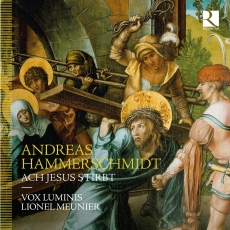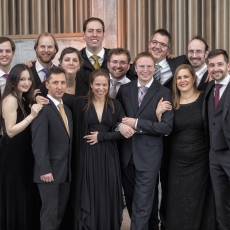Vox Luminis - Hammerschmidt: Ach Jesus stirbt - MusicWeb International
According to the information on the back cover of this release: “Andreas Hammerschmidt is undoubtedly the most unjustly neglected composer of seventeenth-century Lutheran Germany. Very few recordings have been devoted to him, even though his music was widely published during his lifetime. The fifteen or so published collections offer a great variety of works, which, like those of his famous contemporary Heinrich Schütz, illustrate the fusion between the Lutheran polyphonic tradition and the various stylistic influences of the Italian Baroque. For this musical portrait of Hammerschmidt, Vox Luminis has drawn on several of these collections in order to offer as rounded a picture as possible of the variety of the composer's styles. The entire programme is structured around texts for Passiontide and Easter, introduced by an intensely moving madrigalian motet on the death of Christ, “Ach Jesus stirbt.” I must admit that I requested this disc blind; I do not know the composer but thought that this looked interesting, and as a firm believer that we should move beyond our musical comfort zone so that we may widen our horizons, I was therefore willing to take a chance and review it. I am glad I did, as it is more than interesting and is in fact a really entertaining disc, and, despite the Passiontide context of the music, a real discovery.
Hammerschmidt was born into a small Bohemia Protestant community of Brüx. His father was from Saxony, his mother a Bohemian, but in 1626, due to the Thirty Years’ War, as Protestants the family was forced to flee to Saxony to avoid persecution, where they settled in Freiberg. It was here that Andreas is thought to have received his musical education, partly through the city organist and cantor, Stephan Otto. Freiberg also being a major staging point, it has been linked with many notable musicians of the day, it is thought that it was through these that the young Hammerschmidt received extra lessons which kept him in touch with the prevalent musical tastes of the day. In 1633, he left Freiberg for a short appointment as organist to Count Rudolf von Bünau in Weesenstein, returning the following year to Freiberg, where he married. In 1639 he moved to Zittau to assume the post of organist, a position which led to his nickname as the "Orpheus of Zittau". He stayed there for the rest of his life.
The music on this disc exhibits not only a good deal of beauty, but also a significant understanding of the texts he was setting, which lends them religiosity and zeal. His religious music was largely written in the ‘concertato’ style but Hammerschmidt did not restrict his output to purely religious compositions, motets, concertos and arias. He composed over 400 works collected into fifteen separate collections, which, like works by Schütz, were a blend of the Lutheran choral tradition and the early Italian baroque style. Unfortunately, despite all his years employed as an organist, it seems that none of his organ music survives but his ‘concertato’ or his ‘madrigalian motet’ pieces have come to be seen as the precursor of the German church cantata made famous by J S Bach.
The use of brass set against the voices is reminiscent of Schütz. The music is here performed superbly by Vox Luminis and the strings of Clematis give the three tracks where they are featured a different timbre and intensity. The opening track, Ach Jesus stirbt, gives the disc its title, and as the opening statement says, is an “intensely moving madrigalian motet”. It is an intensely beautiful piece, its opening statement of ‘Alas, Jesus is dying on the cross’ and its sentiment being handled exceptionally well, setting the scene for what is to follow. There are many deightful pieces on this disc, such as Ach Gott, warum hast du mein vergessen and the final track, Siehe, wie fein und lieblich ist’s - so much so that I have already ordered further music by Hammerschmidt. As I have already mentioned, the three tracks which feature the strings of Clematis, Bis hin an des Creutzes Stamm, Vater unser, der du bist im Himmel and Wer wälzet uns den Stein, are given a different but equally compelling sonority. Yes, I know we are coming up to Advent and Christmas, so this disc is a little out of season, but when the music and its performance under Lionel Meunier is so good, it deserves to be listened to during any season of the year. This is a wonderful disc of music, which on this evidence justifies its description as “undoubtedly the most unjustly neglected composer of seventeenth-century Lutheran Germany”, and a must for all devotees of baroque vocal music. This is especially true when you take into account the detailed recording, the highly informative booklet essay and full texts in English, German and French.

